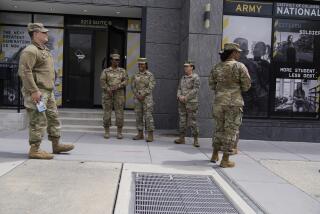Rumsfeld Asks NATO to Trim Bosnia Forces to Bolster War on Terrorism
BRUSSELS — Defense Secretary Donald H. Rumsfeld asked NATO on Tuesday to cut as many as 6,000 troops from a Bosnian peacekeeping mission he described as straining the United States’ ability to carry out the war on terrorism.
“The military mission in Bosnia should have long since ended,” Rumsfeld told ministers at the North Atlantic Treaty Organization during the alliance’s first formal meeting of defense ministers since the Sept. 11 terrorist attacks. “I believe that the time has come to fashion a new, restructured and smaller force in Bosnia.”
The NATO defense ministers approved a plan to keep peacekeeping forces in the Balkans as a whole at about 60,000 for now. That includes forces in Bosnia-Herzegovina, Kosovo and Macedonia.
Rumsfeld’s plan would trim the Bosnia contingent by up to one-third, from 18,400 to about 12,000, when the NATO ministers meet for another six-month review in June.
That would probably free up only about 1,000 U.S. soldiers, but further reductions could cut forces in Kosovo and Macedonia as part of a British proposal to unify the three separate commands and combine some tasks by the end of 2002.
About one in six NATO peacekeepers in the region--9,150 of nearly 60,000--is an American. As the largest contributor to the force, the United States has sent 3,100 of the 18,400 peacekeeping troops in Bosnia, 5,700 of the 39,000 in Kosovo and 350 of the 2,150 in Macedonia.
The Bosnia force, which peaked at 65,000 in 1995, was deployed to cement an agreement ending 3½ years of war. The force has gradually been reduced in size, and Pentagon officials argue that there is no longer a need for tank and other heavily armed units, many of them sent from the United States and Britain.
Civilian police could take over some tasks now performed by soldiers that Rumsfeld said were “putting an increasing strain on both our forces and our resources when they face growing demands from critical missions in the war on terrorism.”
A NATO communique issued Tuesday said the organization would look for “rationalization” of the force to “allow for significant resource savings.” Saying “you can’t get defense on the cheap,” NATO Secretary-General George Robertson suggested that calls for force cuts were getting a warm reception from ministers with strapped budgets.
“The possibility of rationalizing forces in the Balkans is very high on ministers’ consciousness,” Robertson said. The defense chiefs “are also conscious that there might be better and more efficient ways of using the forces in the theater.”
The proposed cuts in Bosnia would mark a start on Rumsfeld’s plan to reorganize a military whose structure is based on Cold War threats to face the newer perils of “rogue” nations and terrorists. Although the plan is not complete, Rumsfeld has made clear that it will mean closing bases and freeing up money for new technology, including the ability to strike foes from farther away and a top-priority missile defense program.
The NATO ministers generally supported updating aging defense strategies to face new threats, a senior Pentagon official at the meeting said.
“The lesson of Sept. 11 was that we do not just plan for the threats and challenges that we have already, but we need to have a very strong toolbox to deal with the threats that cannot be foreseen,” Robertson said.
The terrorist attacks prompted NATO for the first time to invoke Article V of its charter--declaring that an attack on one member is an attack on all.
Rumsfeld said it was clear in his meetings Tuesday that the terrorist attacks had a significant effect on his fellow ministers.
“I can sense a different perspective on their part and indeed different priorities,” he said.
More to Read
Sign up for Essential California
The most important California stories and recommendations in your inbox every morning.
You may occasionally receive promotional content from the Los Angeles Times.










